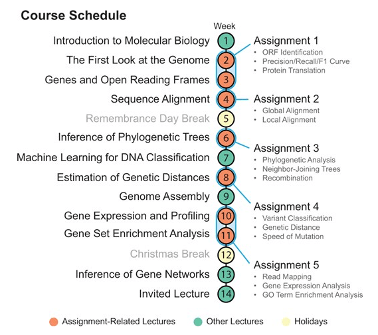Bioinformatics Tutor Fundamentals Explained
Bioinformatics Tutor Fundamentals Explained
Blog Article
What Does Bioinformatics Tutor Do?
Table of ContentsThe Buzz on Bioinformatics TutorBioinformatics Tutor - TruthsA Biased View of Bioinformatics TutorThe 25-Second Trick For Bioinformatics TutorFacts About Bioinformatics Tutor Revealed
Of the overall individuals entailed in the training, 80% were pupils from public college organizations, while the remaining 20% came from exclusive organizations. To get a certification of engagement, trainees were required to participate in a minimum of 90% of the overall training hours. As a result of this need, a remarkable 95% of the participants effectively obtained their certificates, having not just fulfilled the minimum attendance standards but also completed all designated activities throughout the training.
Throughout the height of the COVID-19 pandemic, especially between June and August 2020, the job group was charged with arranging specialized training in bioinformatics. This training was particularly targeted at students from the study group Core for Research in Applied Computing at the Federal University of Pará (UFRA) The adaptation to remote understanding systems due to the pandemic produced a possibility to explore brand-new training methodologies and digital devices that enhanced both reach and effectiveness.
This program was designed to give an easily accessible yet detailed summary of Artificial Knowledge methods, especially as used in bioinformatics (Bioinformatics Tutor). This virtual style enabled involvement from students throughout Brazil, many of whom may not have had the opportunity to go to in-person sessions.
A Biased View of Bioinformatics Tutor
Roughly 50% of the complete training hours were committed to practical activities where students built intelligent designs and applications in a variety of clinical domain names, including genetics, molecular biology, and environmental information evaluation. These platforms allowed trainees to engage in real-time data manipulation, design training, and algorithm testing.
The course attracted 80 participants in total amount. Sixty of them were connected with numerous greater education and learning establishments in the state of Pará, while the continuing to be twenty originated from organizations found in five other Brazilian states. This wide geographical depiction highlighted the nationwide rate of interest in bioinformatics and the growing need for specialized abilities in this location. By introducing Artificial Knowledge in a relevant and useful context, the campaign offered to link the space between concept and real-world application, supplying students with a strong foundation for future research or work in the field.
The training initiative created part of a broader academic outreach effort recognized as the Bioinformatics on the Road project. This task has, for many years, introduced loads of pupils to the globe of bioinformatics and computational biology. The events held under learn this here now this umbrella effort have actually happened throughout several areas and years, as summed up in Table 1 (Listing of occasions, areas, years, and overall numbers of pupils and trainers)
Numerous of these groups, originally brought with each other by their participation in training occasions, have given that gone on to produce independent clinical research study in partnership with local scholastic establishments. The training not just fostered clinical thinking within the context of bioinformatics however also stimulated joint connections that extended beyond the training atmosphere.
Not known Details About Bioinformatics Tutor
The very same team, leaving out IH and RR, likewise acted as tutors for the functional training components. Funding for the task was supplied via the grant 88887.200562/ 2018-00 from CAPES.
The Federal College of Pará's Office of Research study (PROPESP/UFPA) additionally gave financial backing, particularly for the production of the last manuscript. The writers state no monetary or commercial disputes of passion that might have influenced the study. All interpretations and viewpoints expressed in this write-up are exclusively those of the authors and do not always mirror those of their particular institutions, the author, editors, or reviewers included in the magazine procedure.

Things about Bioinformatics Tutor
From a pedagogical perspective, the mentor strategy utilized in the training was deliberately interactive. Classes were conducted in a fashion that click for source urged student participation and discussion, going past rote memorization to explore just how ideas are established, applied in every day life, and evaluated in scholastic setups. The instructional viewpoint concentrated on supporting both solid and battling students, offering customized assistance, and building confidence with continual mentorship and perseverance.

Each team, including about 36 individuals, was sustained by three advisors-- a lot of whom were postdoctoral researchers with specialized check my source proficiency. These advisors not just aided make the team jobs yet also promoted their implementation, ensuring that each research study inquiry was both pertinent and appropriately challenging. The goal was to give a naturally realistic context that individuals can explore with open-ended purposes and access to curated datasets.
For extra understandings into the methodology and outcomes of this project-based understanding method, viewers are routed to S1 Text, which consists of comprehensive descriptions of the pedagogical framework, examination techniques, and job motifs used in the training sessions.
The Best Strategy To Use For Bioinformatics Tutor
Of the total participants included in the training, 80% were trainees from public greater education and learning organizations, while the continuing to be 20% came from private institutions. To qualify for a certificate of engagement, pupils were called for to attend at least 90% of the complete training hours. Especially, beyond the pupils who enrolled in the training sessions, 7 knowledgeable teachers participated in delivering the programs, while 3 specialized study teachers collaborated the general training process. About 50% of the total training hours were committed to practical activities where trainees built intelligent designs and applications in an array of scientific domain names, consisting of genetics, molecular biology, and ecological information analysis. The training not only fostered clinical reasoning within the context of bioinformatics but additionally stimulated collective partnerships that prolonged beyond the training atmosphere.
Report this page